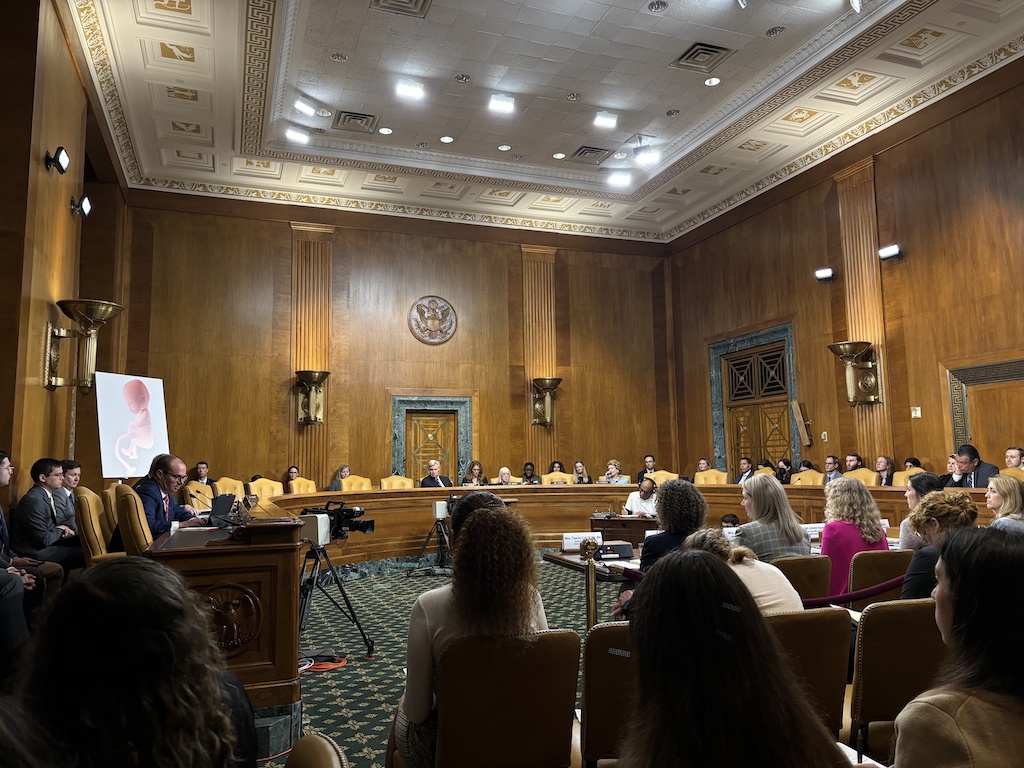WASHINGTON – With ever-changing laws on reproductive rights across the country, advocates are urging Congress to recognize the economic burdens women face when trying to access reproductive healthcare, especially in states where it is restricted.
Allie Phillips, a mother and activist from Tennessee, told the Senate Budget Committee Wednesday of her emotional ordeal, learning that she needed an abortion after finding out the fetus was not developing. Staying pregnant would have put her own life at risk. But due to Tennessee’s abortion ban, she had to travel to New York to have the procedure, which was complicated and expensive.
“I would like to ask the committee to remember my story,” Phillips said. “And to remember that I’m one of thousands, if not millions, of people in this country that need or needed abortion access.”
“We can’t be putting politics into health care decisions,” she said. “And also to remember these facts, that abortion access is essential health care, no matter how you want to look at it.”
Sen. Sheldon Whitehouse, D-Rhode Island, and the budget panel’s chairman, agreed: “Reproductive rights, it turns out, are intrinsically tied to economic opportunity. Reproductive justice is economic justice. Restricting one restricts the other.”
However, Sen. John Kennedy, R-Louisiana, pushed back, arguing that “there is no economic justice for the baby because the baby is dead.” Kennedy then went on to describe in graphic detail what the process of getting an abortion looks like.
The committee hearing came after an Alabama Supreme Court decision last month in February that limited access to IVF treatment in the state, ruling that a frozen embryo is considered a baby.
While the ruling does not eliminate IVF treatment in the state, it allows fertility clinics to be sued under the state’s wrongful death law if embryos are lost or destroyed. This has led several fertility clinics in Alabama to pause treatment.
Alabama lawmakers on Thursday advanced legislation that would provide lawsuit protections for the clinics.
The Alabama ruling came against the backdrop of the Supreme Court’s 2022 decision in Dobbs v. Jackson Women’s Health Organization that overturned Roe v. Wade, the ruling that protected the right to an abortion nationwide. Since then, 14 states have made abortion illegal and many states continue to change their abortion laws.
Witnesses agreed that it is necessary to give women and mothers the support they need, whether they decide to have an abortion or go another route.
“Right now, the Dobbs story is an inequality story, not a macro-level shock story,” Caitlin Myers, a professor of economics at Middlebury College, told senators.
She said the legalization of abortion in the 1970s reduced teen pregnancy, teen marriage and the maternal mortality of black women.
“If abortion access were further restricted, if Congress were to enact a national ban, then we would begin to play the 1970s in reverse, watching the reduction in women’s capacity to fully participate in our nation’s economy,” Myers warned.
Sen. Mike Lee, R-Utah, insisted that the Dobbs decision did not criminalize abortion and did not do anything to affect the legal status of abortion other than giving the decision to the states.
“The Supreme Court and Dobbs simply undid Roe and said ‘This is a decision that most of the time… isn’t normally going to be federal action,’” Lee said.
Restrictions on reproductive freedom impact not only patients but doctors as well, Sen. Chris Van Hollen, D-Maryland, pointed out. There are “real challenges doctors face when trying to navigate the legal areas,” he said.
“…Doctors and their decisions to have to move to other states and how that leaves women in the workforce in states like Tennessee at greater risk,…it’s because doctors don’t want to end up being fined or worse for their actions,” Van Hollen said.
Dr. Leilah Zahedi-Spung, a certified OB-GYN and maternal-fetal medicine physician, told senators the Supreme Court’s action has upended her practice.
“I did 11 years of training in order to become a doctor… and then a law went into effect that took my ability to care for my patients in the way that was necessary away from me, and from so many others,” she said.
Zahedi-Spung said that after Roe v. Wade was overturned, much of her time was spent talking to various lawyers, and she wasn’t able to care for her patients.
The White House on Thursday hosted a roundtable with nine advocacy groups focused on ensuring access to fertility services.
“White House officials reaffirmed the Biden-Harris administration’s commitment to fighting to protect access to reproductive health care, including IVF, in the wake of relentless attacks by Republican elected officials following the Supreme Court’s decision to overturn Roe v. Wade,” according to a statement released by the White House.
President Joe Biden has called on the Congress to pass legislation that would restore abortion rights nationwide.
The organizations represented at the roundtable included the Alliance for Fertility Preservation, the American Cancer Society, the American College of Obstetricians and Gynecologists, the American Society for Reproductive Medicine, Family Equality, the Leukemia & Lymphoma Society, the National Center for Lesbian Rights, RESOLVE: the National Infertility Association and the Sickle Cell Reproductive Health Education Directive.

